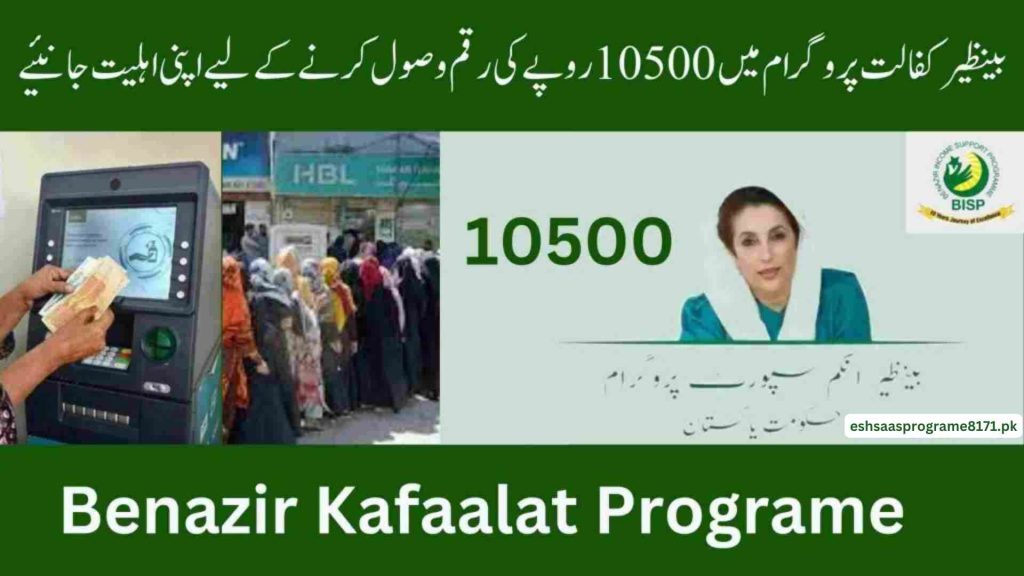Benazir Kafalat Program New Registeration Update 2024
The fundamental element of the BISP is the Unconditional Cash Transfers (UCT) program, which is often referred to as the “Benazir Kafalat Program.” 2008 was the year when it was first implemented. The UCT/Kafalat project has expanded to the point which means it has grown into the one and only biggest cash transfer program in the entire history of Pakistan. This growth has occurred since the program was first introduced.

Objective Benazir Kafalat Program
In the brief run, the program’s purpose was to provide monetary support to families that were qualified in order to protect the negative impacts of weak economic development, food crises, and price inflation on the poor, especially women. Financial help was given to make this happen. In keeping with the Sustainable Development Goals (SDGs), the program’s eternal goals and aims were to end serious and long-lasting hardship and give women greater authority.
As part of the Benazir Kafalat scheme, BISP is now lending money to around 10 million households. Benazir Kafalat is now providing a stipend of Rs. 10,500 per recipient every quarter, which is an increase from the previous stipend of Rs. 3,000 each beneficiary per quarter.
ELIGIBILITY CRITERIA FOR BENAZIR KAFALAT PROGRAM
The beneficiaries of the “Benazir Kafalat Programme” are tracked down and chosen via the use of the scientific method of the Proxy Means Test (PMT), which is conducted through the National Socio-Economic Registry (NSER) report. The Social Security Administration uses a scale that ranges from 0 to 100 to measure the welfare status of a family. The BISP Board makes the decision on the PMT cut-off score requirements for eligibility based on the amount of available financial space. By the Benazir Kafalat Program, monetary aid is being offered to all households who have a PMT score that is within the acceptable range.
INCLUSION OF TRANSGENDER IN BENAZIR KAFALAT PROGRAM
The beneficiaries of the “Benazir Kafaalat Programme” are tracked down and chosen via the use of the scientific method of the Proxy Means Test (PMT), which is conducted through the National Socio-Economic Registry (NSER) report. The Social Security Administration uses a scale that ranges from 0 to 100 to measure the welfare status of a family. The BISP Board makes the decision on the PMT cut-off score requirements for eligibility based on the amount of available financial space. By the Benazir Kafaalat Program, monetary aid is being offered to all households who have a PMT score that is within the acceptable range.
INCLUSION OF TRANSGENDER IN BENAZIR KAFAALAT PROGRAMMEThe Board of Directors of the Benazir Kafaalat Program (BISP) has just approved a policy that will allow transgender individuals to receive aid through the Benazir Kafaalat Program:
- Transgender people must get a CNIC from NADRA that clearly states their gender as transgender.
- They must complete a survey at one of the Benazir Registration Centers that have been set up in every BISP Tehsil Office.
- Fortunately, PMT cut-off limitations have been reduced, which means that all transgender people whose survey goes well may submit applications in order to become part of the initiative.
- Once NADRA confirms the data, transgender people are formally recognized beneficiaries and may begin to get cash from BISP’s affiliated banks.
Biometric Verification System
Once the Biometric Verification System (BVS) has been completed, the Benazir Kafalat financial aid is distributed to the recipients who are qualified for it. This is done via two a subsidiary bank: HBL in Punjab, Sindh Province & Baluchistan Province, and Bank Alfalah in KP, Gilgit Baltistan, and Azad Jammu and Kashmir
Policy of the Next of Kin
- The BISP has a program in place called Next of Kin, which ensures that the relatives of dead recipients will continue to receive financial assistance support after their passing.
- In accordance with this policy, the legal heirs of the dead beneficiary family have the opportunity to become beneficiaries of the program by means of an appeal system that has been carefully crafted.
- If a beneficiary passes away, her family is obligated to provide the relevant documentation (CNIC of the dead, CNIC cancellation certificate from NADRA, death certificate from union council, and CNIC of family members) to the closest BISP Tehsil Office.
- This is applicable in the event when a beneficiary passes away.
- Following the completion of the procedure, the next-of-kin family members, as specified by the BISP rules, will begin receiving compensation.
FAQs
Conclusion
The program’s purpose to provide monetary support to families that are qualified in order to protect the negative impacts of weak economic development, food crises, and price inflation on the poor, especially women.

Hamare benazir ke paise Nahin a rahe the pahle meri ammi ko kist Mili thi ab Nahin Mili hai lbi